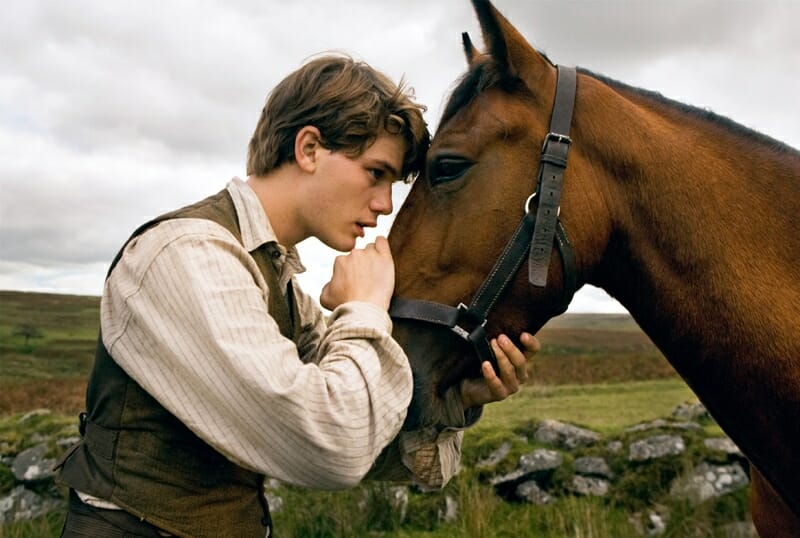Only a true visionary like Steven Spielberg could take a simple story about a horse and transform it into a grandiose work of cinema. Though not the acclaimed filmmaker’s greatest feat, War Horse is a poignant picture wrapped warmly in humanity. The film, despite an entirely different setting, also evokes prior Spielbergian gems such as Close Encounters of the Third Kind and E.T. with its redemptive inferences.
Adapted from Michael Morpurgo’s 1982 children’s novel of the same name, War Horse tells the story of a boy, Edgar (Jeremy Irvine), and his beloved horse, Joey. From the genesis of their relationship on the English countryside, to Joey’s involvement in World War I, to the hopes of their eventual reunion, the film captures the journey of the horse and the pivotal effect it has on everyone whom the horse encounters, particularly Edgar.
In the same way he previously used aliens, Spielberg uses Joey as a supernatural catalyst for hope and salvation amid difficult circumstances. The horse’s very being, a representation of all that is good in the world, brings redemption to children, families, soldiers and, essentially, a war. Because of this, he receives the nickname “miracle horse.”
Joey’s transcendence becomes especially realized in a humorous war sequence during the film’s second half. Caught in barbed wire in the middle of the battlefield, he fights to survive and inspires soldiers from both regimes to momentarily set aside their differences to rescue him. The unlikely scenario invokes humor as two enemies, who moments before were intent of killing each other, engage in small talk on the front line but, even more, it further confirms Joey as a vehicle of divine intervention.
This sequence portrays redemption on a macro level, but perhaps the most moving aspects of the film lie in the smaller moments in which Joey forms a bond with different characters. In these threads, Spielberg taps into human experience the most directly. As Joey brings out the good in a host of minor characters—beset as they are by struggles so familiar to us all—the audience connects with them, as well.
His relationship with Edgar epitomizes such humanity. Through a series of personal and social challenges, which parallel our economic times, the two develop a powerful friendship, and Edgar, as well as everyone in his life, grows because of it. Focusing on a boy who longs for family and purpose, their relationship channels that of Elliot and E.T, feeling just as emotionally involving.
Playing the kind and dreamy Edgar, also somewhat reminiscent of Elliot in temperament, Irvine brings the bond to life through a riveting performance. His character is honest, believable and thus relatable. Spielberg found a real prize in the young, unfamiliar actor; Irvine carries the film as if he’s been doing this sort of thing for years.
Peter Mullan, a master of understatement, brings the same amount of sincerity to his role as Ted, Edgar’s drunkard father. His subtlety performance gives the war-torn father added depth. But then, pretty much every actor makes a lasting impression, from Emily Watson’s wife and mother to Tom Hiddleston’s noble army captain who, in spite of tragedy, finds himself inspired by his time with Joey.
Likewise, all the central characters, even those who are dark and jaded, are awash in the glowing optimism often found in the works of Spielberg. As they captivate us and make us care, we see again a sense of hope in them and, as an extension, humanity—all because of the hope they see and experience in Joey.
Such hope, which carries with it a childlike quality, fills the entire film from beginning to end. It emerges in the stunning visuals—the pure beauty of the horses, the greens and blues of rural England, the bright stars and explosions in the sky among the bloody battlefields of World War I—as well as the beautifully composed score by John Williams, who perhaps captures through music the tone of a story better than any living composer.
In our cynical world, though, where the words “bleak” and “art” are often synonymous, this genuine optimism—a trademark of Spielberg—may not be so well received, especially when placed in a vessel as relatively unhip as a horse. That such a cultural blind spot might keep a film like War Horse from being recognized as the masterful and entertaining piece of art that it is—well, that would be a tragedy.
Director: Steven Spielberg
Writer: Lee Hall & Richard Curtis (screenplay) & Michael Morpurgo(novel)
Starring: Jeremy Irvine, Peter Mullan, Emily Watson & Tom Hiddleston
Release Date: Dec. 25, 2011
